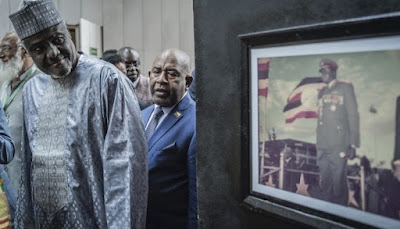Published Thursday 13 July 2023; 07:41 PM - here is a full copy:
Communique of Sudan’s Neighboring States Summit
Upon the invitation of H.E. Abdel Fattah El-Sisi, President of the Arab Republic of Egypt, the heads of state and governments of the Central African Republic, Chad, Eritrea, Ethiopia, Libya and South Sudan, with the presence of the Chairman of the African Union Commission and the Secretary General of the League of Arab States, met in Cairo on July 13, 2023 to attend the “Sudan’s Neighboring States Summit”. They discussed various aspects of the situation in Sudan and deliberated on possible solutions to end the crisis. The leaders agreed on the following:
1- Expressing their deep concern regarding the ongoing military confrontations and the continuous deterioration of the security and humanitarian situations in Sudan. The leaders called on the parties to the conflict to de-escalate the situation and commit to an immediate and sustainable cease-fire to end the war, and avoiding further loss of innocent civilian Sudanese lives and destruction of property.
2- Affirming their full respect for the sovereignty, unity and territorial integrity of Sudan. The leaders agreed that the current conflict is an internal Sudanese affair, and stressed the need for ending any external interferences in the crisis. Such interferences protract the conflict and obstruct efforts to contain its escalation and reach an agreed settlement that will restore stability and security in Sudan.
3- Reiterating the importance of preserving the Sudanese State and its institutions, and preventing the fragmentation of the country, or descent into chaos that could lead to the spread of terrorism and organized crime, and other serious impacts on the national security of neighboring states and overall regional stability.
4- Stressing the utmost priority of formulating a comprehensive approach to addressing the current crisis and its humanitarian ramifications, including pertaining to those internally displaced and the growing influx of refugees fleeing the conflict to neighboring states, a challenging situation that creates growing pressure on the resources of neighboring states. The leaders called on the international community and donor countries to shoulder their responsibility through upholding pledges made at the “Ministerial-level Pledging Event to Support the Humanitarian Response in Sudan and the Region”, attended by Sudan’s neighboring states on June 19, 2023.
5- Expressing grave concern regarding the deterioration of the humanitarian situation in Sudan, and condemning the repeated attacks on civilians, healthcare facilities and public services outlets. The leaders also called on the international community to step up efforts to provide crucial humanitarian aid, and to address urgent shortages in food and medical supplies in Sudan, as a measure towards alleviating the serious hardships caused by the crisis on innocent civilians.
6- Agreeing to facilitate the entry of humanitarian aid provided to Sudan through the territories of neighboring states, in coordination with relevant international agencies and organizations, and to strongly promote the establishment of safe passage for aid deliveries to the most affected and vulnerable areas. In this context, the leaders urged various Sudanese parties to provide the necessary protection for humanitarian assistance and personnel and to facilitate their mission in delivering assistance to those in need.
7- Emphasizing the pressing need for a political solution to stop the ongoing conflict. To this end, the leaders called for an inclusive and comprehensive national dialogue between Sudanese parties, prioritizing the aspirations and prosperity of the Sudanese people through the restoration of stability and security to the country.
8- Agreeing to form a Ministerial Mechanism comprised of foreign ministers of Sudan’s neighboring states to coordinate common efforts to resolve the current conflict. The Ministerial Mechanism shall hold its first meeting in N’Djamena and will be mandated to take the following measures:
A- Develop an action-plan that includes practical steps towards stopping the fighting and reaching a comprehensive solution to the crisis through direct communication with various Sudanese parties, in complementarity with the existing mechanisms, including the IGAD and AU.
B- Discuss measures required to address the impact of the crisis on the future of Sudan’s stability, unity and territorial integrity, as well as to protect and preserve Sudan’s national institutions. The Ministerial Mechanism shall also discuss steps to contain the negative effects of the crisis on neighboring states, and agree on a delivery mechanism to provide humanitarian aid and relief to the Sudanese people.
C- The Ministerial Mechanism shall present its recommendations to the next Sudan’s Neighboring States Summit.
View original:
https://www.sis.gov.eg/Story/183662/Communique-of-Sudan’s-Neighboring-States-Summit/
[Ends]







.jpeg)


